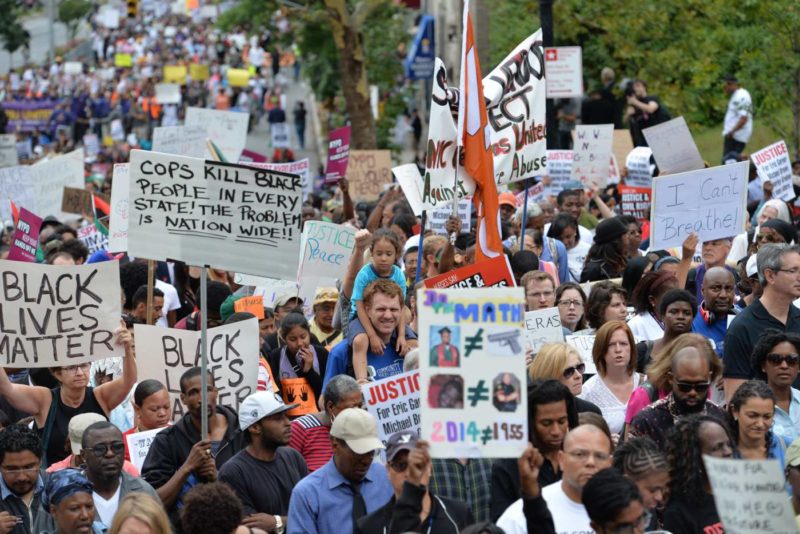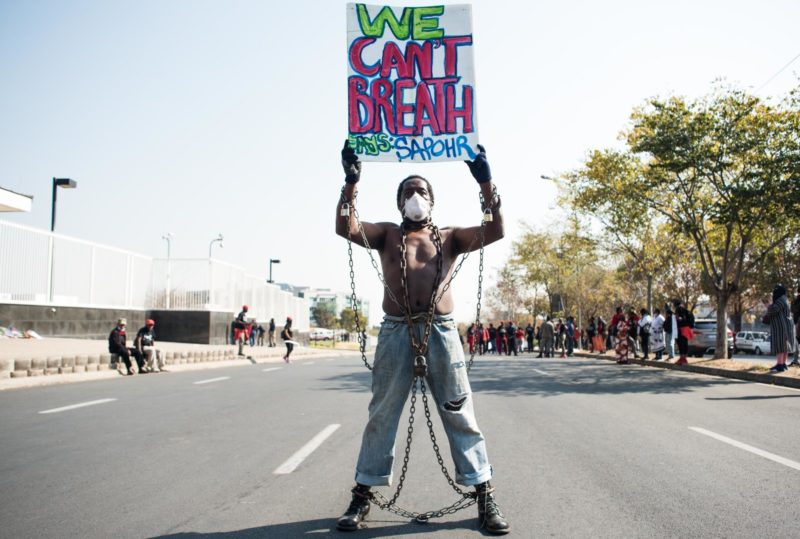Special News Series: Rising Up For Justice! – In 2020, Protests Spread Across The Globe With A Similar Message: Black Lives Matter
Share
Explore Our Galleries
Breaking News!
Today's news and culture by Black and other reporters in the Black and mainstream media.
Ways to Support ABHM?
Introduction To This Series:
This post is one installment in an ongoing news series: a “living history” of the current national and international uprising for justice.
Today’s movement descends directly from the many earlier civil rights struggles against repeated injustices and race-based violence, including the killing of unarmed Black people. The posts in this series serve as a timeline of the uprising that began on May 26, 2020, the day after a Minneapolis police officer killed an unarmed Black man, George Floyd, by kneeling on his neck. The viral video of Floyd’s torturous suffocation brought unprecedented national awareness to the ongoing demand to truly make Black Lives Matter in this country.
The posts in this series focus on stories of the particular killings that have spurred the current uprising and on the protests taking place around the USA and across the globe. Sadly, thousands of people have lost their lives to systemic racial, gender, sexuality, judicial, and economic injustice. The few whose names are listed here represent the countless others lost before and since. Likewise, we can report but a few of the countless demonstrations for justice now taking place in our major cities, small towns, and suburbs.

To view the entire series of Rising Up for Justice! posts, insert “rising up” in the search bar above.
In 2020, Protests Spread Across The Globe With A Similar Message: Black Lives Matter
By David Greene and Ashley Westerman, NPR
December 30, 2020

The Black Lives Matter movement became an international phenomenon in 2020. As protesters took to the streets in cities across the U.S. in the aftermath of the police killing of George Floyd, a Black man in Minneapolis, Minn., so did demonstrators in other countries — all with a similar message: Black lives matter.
“There is a George Floyd in every country,” South Africa-based journalist Lynsey Chutel tells NPR’s David Greene during a recent roundtable interview.
Joining Chutel for Morning Edition‘s roundtable are Ana Luisa González, a freelance journalist based in Colombia and Febriana Firdaus, a freelance investigative journalist based in Indonesia.
Demonstrations spread across Colombia in June. They were sparked by the May killing of a young Black man named Anderson Arboleda in Puerto Tejada, who was allegedly beaten to death by police for breaking pandemic rules. Activists called for justice for Arboleda and other young Afro-Latino men killed by police.
“This message of this movement — Las Vidas Negras Importan — of Black Lives Matter, were young Afro-Colombians who wanted to speak out against police brutality and structural racism,” Gonzales says. Like much of Latin America, Spanish colonialism informs many societal divisions in Colombia today, she says…
In South Africa, demonstrators came together following the police killing of 16-year-old Nathaniel Julies, a boy of mixed heritage with Down syndrome. Julies was shot and killed in August by police near his home in a neighborhood of Soweto allegedly for being outside his home during a pandemic lockdown. Chutel says that in the days after young people marched to the police station out of a sense of “deep frustration with this police station and the police force in general who are able to behave with impunity…”
Activists in Indonesia inspired by the Black Lives Matter movement also made the message their own. The phrase #AllPapuanLivesMatter went viral, calling attention to the decades-long secessionist movement in West Papua, which has created tensions between the minority Papuans and ethnic Javanese-majority in the country.
Read the full article here.
More Breaking News here.
Explore the ABHM galleries here.









Comments Are Welcome
Note: We moderate submissions in order to create a space for meaningful dialogue, a space where museum visitors – adults and youth –– can exchange informed, thoughtful, and relevant comments that add value to our exhibits.
Racial slurs, personal attacks, obscenity, profanity, and SHOUTING do not meet the above standard. Such comments are posted in the exhibit Hateful Speech. Commercial promotions, impersonations, and incoherent comments likewise fail to meet our goals, so will not be posted. Submissions longer than 120 words will be shortened.
See our full Comments Policy here.